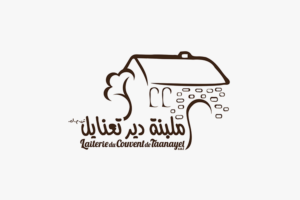Registered in 1994, the “Laiterie du couvent de Taanayel’ has been managed by arcenciel since 2009. Trusted by the inhabitants of the region since its operation in the 1960s, the “malbané” as it is widely known, produces authentic Lebanese dairy products without additives or preservatives. Laiterie du couvent aims to establish a pilot model for sustainable dairy production, to be followed by the industries in Lebanon. Most recently, they have acquired ISO 9001 certification.
All products are natural, of farm and craft production, without preservatives or additives. The entire process is completed on site at the Domaine de Taanayel.
With the help of the Jesuit fathers, in 1958 the dairy farm began to commercially produce dairy products. The actual brand “La Laiterie du Couvent de Taanayel” was created and put on the market in 1994.
DID YOU KNOW?
La Laiterie du couvent de Taanayel is notably the only one in Lebanon which makes the yellow Dutch cheese known as Gouda. Arcenciel’s Gouda is fermented from 3 to 18 months at 12° C in a refrigerated chamber, with humidity neighboring 70%.
They also produce fresh and quality products coming from dairy cows living at the Domaine. All production begins and ends in Taanayel, assuring fresh products. The dairy farm cultivates part of its own fodder crop and produces and uses additive-free fresh milk. A low-fat range of products complements the base brands.
Dairy products include: Goat milk yogurt, goat milk, labneh (pressed yogurt), Ayran Laban, butter, fresh cream, raw and pasteurized milk, Halloum, Akkawi, Nabelsi, Kariche, Majdoule, Chanklish, double crème, Mozarella, Baladi cheese without salt…
WHAT’S THE INNOVATION?
Arcenciel is working to develop and modernize the dairy farm, to improve the quality of its products and to better its environmental footprint.
To do so, La Laiterie du Couvent de Taanayel:
- has been running on solar energy since 2010.
- treats its wastewater.
- reduces waste by recycling the packaging, composting organic wastes, and is working on a biogas production project.
- foster innovation, especially on the level of product innovation (gouda, tom…).
Furthermore, arcenciel is developing an inclusive business model for the “laiterie du couvent de Taanayel“, that supports small milk producers, mainly by establishing a milk collection center that buys milk at a fair price from farmers, thus reducing their dependency on big dairy processing units that control the milk prices. This will be coupled with a service center that ensures quality services for farms across the dairy value chain; this will help small farmers to increase their productivity (increasing production and reducing production cost mainly through economy of scale) and improving the quality of milk; this will help us to cope with the milk shortage this year due to currency devaluation and increased demand on local products.
WHAT’S THE STORY BEHIND THE INNOVATION?
The Sustainable Agriculture and Environment program within arcenciel, uses technological innovation to responsibly draw upon natural resources for the benefit of present and future generations. The program manages the Domaine de Taanayel, a plot of land 2.3km2 in size, that pioneers sustainable agriculture in the region. This Domaine runs nearly exclusively on solar energy, streamlines fertigation (an irrigation system that injects water soluble fertilizer into crop water) and is the only producer of natural biopesticides in the region. Arcenciel started managing domaine de Taanayel and the laiterie du couvent de Taanayel in 2009.
WHY IS IT IMPORTANT?
Based on arcenciel’s mode of operation, la laiterie du couvent de Taaanyel is a model to be replicated in order to diffuse good practices and success stories. Also, as service center, it helps small cow farmers and agro-food producers
Furthermore, the aim of arcenciel’s strategy is to have an influence on a public programs and policies. In the case of dairy sector, the pillars of this program are:
- Reduces the dependency of small farms on big dairy processing units by giving them the power of negotiation.
- Organizes the pricing of raw milk taking into consideration the quality of the milk (mainly fat content).
- Improves the sustainability of the sector with a focus on feed supply sources, especially since the sector depends a lot on imported feed.
- Fosters innovation in the dairy production sector and involving more youth in the sector.
- Encourages circular economies approaches within this sector focusing mainly on waste management and renewable energy (biogas, solar energy, etc.).
WHO IS BENIFITTING?
The whole community: School and university students, other industrialists, farmers, small agro-food producers, clients that seek healthy and natural products…



